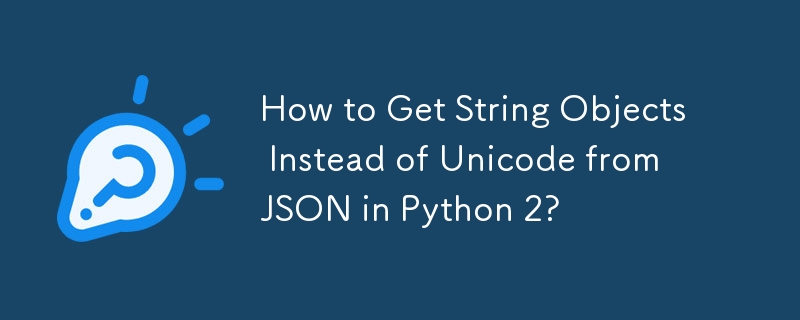 Backend Development
Backend Development
 Python Tutorial
Python Tutorial
 How to Get String Objects Instead of Unicode from JSON in Python 2?
How to Get String Objects Instead of Unicode from JSON in Python 2?
How to Get String Objects Instead of Unicode from JSON in Python 2?

Getting String Objects Instead of Unicode from JSON (Python 2)
When parsing JSON from ASCII-encoded text files in Python 2, the default behavior is to represent string values as Unicode objects. This can pose a problem when working with libraries that only accept string objects.
Fortunately, there are several ways to obtain string objects instead of Unicode objects:
Using PyYAML
PyYAML is a Python library for parsing YAML, which is a superset of JSON. It provides a convenient way to get string objects while preserving the JSON structure:
<code class="python">import yaml json_string = '["a", "b"]' data = yaml.safe_load(json_string) # Returns a list of strings</code>
Note: This method only works for ASCII-encoded data.
Converting Unicode to String Objects
If the data is Unicode-encoded, you can use a conversion function to convert the Unicode strings to regular strings:
<code class="python">def unicode_to_string(obj):
if isinstance(obj, basestring):
return obj.encode('utf-8')
elif isinstance(obj, dict):
return dict((unicode_to_string(k), unicode_to_string(v)) for k, v in obj.iteritems())
elif isinstance(obj, list):
return [unicode_to_string(v) for v in obj]
else:
return obj
# Usage:
json_string = '["\u00e1", "\u00e9"]'
data = json.loads(json_string)
converted_data = unicode_to_string(data) # Converts Unicode strings to strings</code>Using an Object Hook
You can also use an object hook to convert Unicode strings to strings during serialization:
<code class="python">import json
def object_hook(obj):
if isinstance(obj, unicode):
return obj.encode('utf-8')
return obj
# Usage:
json_string = '["a", "b"]'
data = json.loads(json_string, object_hook=object_hook) # Converts Unicode strings to strings during deserialization</code>The above is the detailed content of How to Get String Objects Instead of Unicode from JSON in Python 2?. For more information, please follow other related articles on the PHP Chinese website!

Hot AI Tools

Undresser.AI Undress
AI-powered app for creating realistic nude photos

AI Clothes Remover
Online AI tool for removing clothes from photos.

Undress AI Tool
Undress images for free

Clothoff.io
AI clothes remover

AI Hentai Generator
Generate AI Hentai for free.

Hot Article

Hot Tools

Notepad++7.3.1
Easy-to-use and free code editor

SublimeText3 Chinese version
Chinese version, very easy to use

Zend Studio 13.0.1
Powerful PHP integrated development environment

Dreamweaver CS6
Visual web development tools

SublimeText3 Mac version
God-level code editing software (SublimeText3)

Hot Topics
 1386
1386
 52
52
 How to solve the permissions problem encountered when viewing Python version in Linux terminal?
Apr 01, 2025 pm 05:09 PM
How to solve the permissions problem encountered when viewing Python version in Linux terminal?
Apr 01, 2025 pm 05:09 PM
Solution to permission issues when viewing Python version in Linux terminal When you try to view Python version in Linux terminal, enter python...
 How to efficiently copy the entire column of one DataFrame into another DataFrame with different structures in Python?
Apr 01, 2025 pm 11:15 PM
How to efficiently copy the entire column of one DataFrame into another DataFrame with different structures in Python?
Apr 01, 2025 pm 11:15 PM
When using Python's pandas library, how to copy whole columns between two DataFrames with different structures is a common problem. Suppose we have two Dats...
 How to teach computer novice programming basics in project and problem-driven methods within 10 hours?
Apr 02, 2025 am 07:18 AM
How to teach computer novice programming basics in project and problem-driven methods within 10 hours?
Apr 02, 2025 am 07:18 AM
How to teach computer novice programming basics within 10 hours? If you only have 10 hours to teach computer novice some programming knowledge, what would you choose to teach...
 How to avoid being detected by the browser when using Fiddler Everywhere for man-in-the-middle reading?
Apr 02, 2025 am 07:15 AM
How to avoid being detected by the browser when using Fiddler Everywhere for man-in-the-middle reading?
Apr 02, 2025 am 07:15 AM
How to avoid being detected when using FiddlerEverywhere for man-in-the-middle readings When you use FiddlerEverywhere...
 What are regular expressions?
Mar 20, 2025 pm 06:25 PM
What are regular expressions?
Mar 20, 2025 pm 06:25 PM
Regular expressions are powerful tools for pattern matching and text manipulation in programming, enhancing efficiency in text processing across various applications.
 How does Uvicorn continuously listen for HTTP requests without serving_forever()?
Apr 01, 2025 pm 10:51 PM
How does Uvicorn continuously listen for HTTP requests without serving_forever()?
Apr 01, 2025 pm 10:51 PM
How does Uvicorn continuously listen for HTTP requests? Uvicorn is a lightweight web server based on ASGI. One of its core functions is to listen for HTTP requests and proceed...
 What are some popular Python libraries and their uses?
Mar 21, 2025 pm 06:46 PM
What are some popular Python libraries and their uses?
Mar 21, 2025 pm 06:46 PM
The article discusses popular Python libraries like NumPy, Pandas, Matplotlib, Scikit-learn, TensorFlow, Django, Flask, and Requests, detailing their uses in scientific computing, data analysis, visualization, machine learning, web development, and H
 How to dynamically create an object through a string and call its methods in Python?
Apr 01, 2025 pm 11:18 PM
How to dynamically create an object through a string and call its methods in Python?
Apr 01, 2025 pm 11:18 PM
In Python, how to dynamically create an object through a string and call its methods? This is a common programming requirement, especially if it needs to be configured or run...




